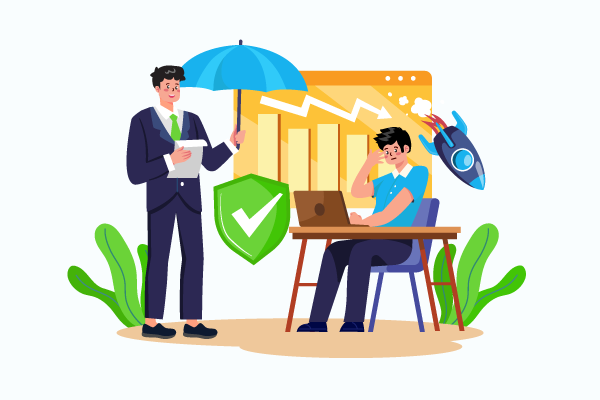Employees rarely need to think about workers’ compensation later on because most large employers go over them during the hiring process.
In the event of an injury on the job, what happens if there is no workers’ compensation? Are you protected from medical costs once you get hurt? Today, we want to walk you through what we recommend doing for an employee without workers’ compensation.
Before we begin, if you are in the hiring process and your new employer hasn’t gone over the workers’ compensation package, be sure to ask.
One thing to keep in mind is knowing your options if you get hurt. Furthermore, if there is not yet a workers’ compensation package, you might be able to persuade them to get one at least and use it as a tool for negotiating.
Workers’ compensation insurance is required in most states. In some cases, there are exceptions, but most of those involve sole proprietorships or small businesses with few employees.
If you do not have workers’ compensation insurance, what can you realistically expect?
There are several factors to consider. Let’s take a look.
What To Do If You Are Injured
The first thing you do when injured at work is to seek medical attention, right? That’s the most critical thing to do. The sooner you seek help, the better the chance you have of recovering quickly. Next, it is important to begin documenting the process.
The first step is to inform your supervisor of the injury. If you don’t report the accident, you don’t have any evidence that the injury occurred at work. You must report the incident and document your injuries regardless of whether your company offers workers’ compensation. You should report this verbally, via email, text, or by phone as soon as possible. Keep a record of all correspondence, doctor’s visits, and hospital bills from now on. If you decide to ask your employer to help you cover the costs, you might need these documents.
What Happens If You Don't Have Workers' Comp?
Worker’s compensation coverage is another thing you have to consider and budget for.
Your business size will affect the cost of workers’ comp.
Workers’ compensation insurance is regulated by the state where you live, so there is no one hard and fast rule.
You can find the rules that apply to you by browsing the workers’ compensation laws of each state at the National Federation of Independent Business.
You are likely required to carry workers’ compensation insurance, if you have employees (whether they’re full-time or part-time). This regulation is based on how many workers you have; some states require workers’ compensation coverage even if you have one employee while others require three employees.
Without Workers' Comp, Here's What Happens
If you don’t have workers’ compensation insurance and have employees, what do you do?
A violation can result in fines, lawsuits, and even prison time. The penalties for not carrying a workers’ compensation policy will vary from state to state.
The majority of health insurance companies do not cover work-related injuries.
As a result, if you are injured at work, you will not only have to pay for your medical treatment, but you will also lose out on wages.
If your boss doesn’t have workers’ compensation insurance, you have two choices: sue them for personal injuries, or check with your state’s Labor Department for government coverage.
Filing a lawsuit against your employer can have its benefits and drawbacks. One of the most obvious reasons is that the process may take months or even years to complete. It’s a long time to wait for your medical bills to be paid. During that period, you won’t receive a paycheck, and you’ll also have to pay the legal fees.
However, the courts may also award you benefits that are not covered by workers’ compensation, such as future lost earnings, punitive damages, and pain and suffering; in the event that you win your case.
The Uninsured Employers’ Funds or something similar is provided by many states for people injured at work by uninsured employers.
Through this program, you may be able to get your medical bills covered and receive payment for some of your lost wages. You can contact your state’s workers’ compensation office for assistance. In some states, there are also temporary disability programs that provide short-term benefits while you are unemployed.
Additionally, injured workers can sue companies that should have had workers’ compensation but didn’t.
If You Have No Employees
Perhaps you are self-employed, you’re a single-person business and proud of it.
You don’t need to acquire workers’ compensation coverage in this situation.
In any case, it may be a smart investment to protect yourself against a major financial burden in the event that you are injured on the job.
When It Comes To Independent Contractors
Let’s say you don’t have any employees at your company, but you work with many independent contractors.
You’ll have to check what the state’s workers’ compensation requirements are for independent contractors.
Many states view independent contractors as employees, which means you need workers’ compensation insurance to cover them.
Your state’s laws and views on independent contractors will play a large role in this, as well as whether you’ve correctly classified the worker.
Employees who are misclassified as independent contractors are subject to penalties and headaches.
When the person is actually an independent contractor and your state does not require you to provide them with workers’ compensation insurance, then you are not required to provide them with coverage.
That doesn’t mean an injured contractor will not sue you to try and recoup those wages and cover medical costs.
If you misclassify an employee as an independent contractor in order to avoid paying for workers’ compensation insurance, then you are going to face state penalties for not providing the necessary insurance as well as fines for misclassifying an employee.
Florida Personal Injury Claims
In Florida, injured workers cannot sue their employers, and instead must rely on the exclusive remedies provided by workers’ compensation law.
There are some exceptions, however, in which an employee can bring a personal injury lawsuit against their employer.
In this case, they are required to demonstrate that they were injured as a result of an intentional act or commission by their employer.
Any claim for personal injury must be substantiated by negligence. Therefore, you will need to prove that your employer was negligent and that this directly resulted in your injuries.
Workers’ compensation claims have a two-year Statute of Limitations, whereas personal injury claims have a four-year Statute of Limitations. Although this is the case, you should ideally begin the process as soon as possible.
In order to preserve evidence, you will have to:
-Keep a record of how the incident occurred as soon after it happens as possible.
-Get the names and contact information of any colleagues or members of the public who witnessed the incident
-Get pictures of any visible injuries as soon as possible
-A personal injury attorney can help you determine whether your claim against your employer is valid before you make any written or verbal statements to your own insurance company
You also need to prove that your employer:
-Failed to fulfill the duty not to injure you
-The failure directly contributed to your injury
-You suffered damages as a result of being injured while at work
PEOPAYGO Offers Free Quotes For Workers' Compensation
Businesses and self-employed contractors might want to consider getting a policy that protects their business if they get hurt at work instead of skipping workers’ compensation protection.
As a leading small business insurer, PEOPayGo is a great option.
As a Professional Employee Organization (PEO), P.E.O.PayGo can help you get workers comp, bundle payroll, HR, and perform all the headache functions of a small business, all while saving your time and money.
Let our Instaquote do all the work, we don’t need much information and it takes 2 minutes. Our software does all the work for you.
Get Ready, Set, and Covered Now!




